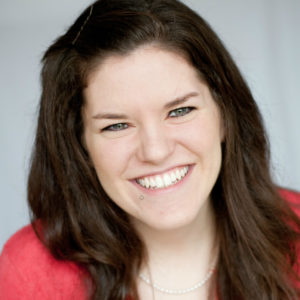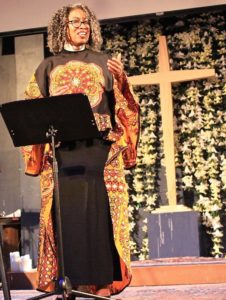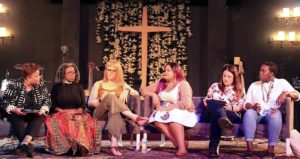 “I am angry.”
“I am angry.”
Although expressed in various ways, this was a common refrain from speakers at the Nevertheless She Preached conference Sept. 23-25 in Waco, Texas.
“We’re angry and we sell it, and the Church has a lot to do with it,” claimed Enedina Vasquez, rector of the Lutheran Church of the Good Shepherd in San Antonio, Texas.
“Anger affects us physiologically, so when we try to hide it, our bodies make us feel it,” said Kyndra Frazier, director of HOPE Center in Harlem, New York.
Throughout the first day of the conference, I tried to suppress my own anger. But, as I heard these words bounce off the walls of the University Baptist Church sanctuary and into my ears, I couldn’t escape the rage building up inside me.
Being a woman in Baptist life is not easy. Being a woman in Baptist life called to ministry is even more difficult. Being a woman in Baptist life called to a ministry of preaching and pastoring sometimes seems impossible.
“Where were the people who taught me to preach? Where were the people who invested in me, trained me and helped me find my voice?”
Walking into the sanctuary on the first day of the conference, I carried the weight of a weekend inundated with messages from the leaders of our country that women’s bodies do not matter, that women’s voices are not worth being heard, and that it is OK for women to live in fear of being violated because “boys will be boys.” I carried the weight of wondering if not being in full-time ministry meant that I no longer belonged in a room full of ministers. I carried the weight of hopelessness and heartache for my country, my religion and my gender.
Walking into the sanctuary that day, I remembered a tweet from the previous day from a mentor – one of the first people to ensure that I heard women preaching as a teenager – who was making his way to a preaching conference a mere 90 minutes away from the one I was attending.
Walking into the sanctuary, I looked around for familiar faces and found only a handful.
One might say that this was an opportunity to make new friends. And while I was eager to be around powerful women for two days, learning how to preach persistently, boldly and courageously, I couldn’t help feeling disheartened by the faces I didn’t see.
Where were the people who taught me to preach? Where were the people who encouraged that spark within me that led me to explore my countercultural calling? Where were the people who invested in me, trained me and helped me find my voice? Didn’t they belong here too? What would it mean to know that they found this conference as important as I did?

Conference speaker Wil Gafney of Brite Divinity School preaches on “Nevertheless Gomer Persisted.”
“Why aren’t men flocking to hear women teach about speaking and preaching,” asked one speaker, Wil Gafney, associate professor of Hebrew Bible at Brite Divinity School in Fort Worth, Texas. “When they let us in, we flock to their conferences.”
Gafney’s words rang over and over in my head, haunting my thoughts.
Once again, I looked around the room at the faces of hundreds gathered to hear powerful, courageous, academic preachers teach about the calling we all share to preach the Gospel. At that moment, I could count the number of men on both hands, and the number I knew personally on one finger.
So many male pastors, professors and mentors will make time for a preaching conference this year. Maybe they’ll go to Dallas to hear Tony Campolo or Chattanooga to hear Brian McLaren, but clearly the majority of these male influencers chose not to be here.
I understand that Waco is not a destination location unless you are a “Fixer Upper” fan. I understand that the organizers of Nevertheless She Preached are not an established church or seminary. I even understand that it would be countercultural to attend this event instead of the more accredited conferences with more years under their belt.
But where are the men who just last weekend were posting on twitter that it is time to listen to women? Where are the men who teach the importance of hearing from voices outside your own experience? Where are the men who speak of empowering women and advocating for women in ministry?
I am angry.
I am angry, because I don’t care about “Fixer Upper,” but I feel like I came to Waco to be siloed in a room full of people who share my gender identity.
I am angry, because I see the potential this event has for dialogue and education. I am angry, because I know that potential will barely be tapped this year, because the women gathered will walk back into a patriarchal society where we have to scream to be heard and fight to be believed.

Panelists discuss “Intersectional Feminism.” From left: Elise Edwards, Wil Gafney, Allyson Dylan Robinson, AnaYelsi Velasco Sanchez, Jennifer Knapp and Kyndra Frazier. (Photos by Stephanie Drum)
This event started in 2017 because two women approached their university and asked to hear more female preachers represented on campus. After being repeatedly ignored, the two chose to bring female preachers to their university town themselves, with nothing more than sponsorships from organizations and people who believed in the cause and proceeds from t-shirt sales.
Their efforts resulted in a cathartic, empowering time of worship, education and solidarity for an ecumenical gathering of people who believe female voices matter.
And I am grateful to co-founders Kyndall Rothaus and Natalie Webb and the team of people they enlisted to organize this amazing event.
But I am also angry that the people who helped me find my voice in the first place are not here.
In her lecture, Vasquez also said that “anger sets you free when you begin to understand it” and that “my poetry is my strongest voice because it has the anger in it… and it is how I pray.”
Today, I don’t have poetry, but I do have a prayer – a dream rising out of the ashes from the fumes of my anger.
“Where are the men who speak of empowering women and advocating for women in ministry?”
I pray that next year, we will be smashing the patriarchy side-by-side with the men who preached to us as little girls, who taught us in seminary classrooms and who encouraged us to speak truth to power. I pray that next year, the men who say they support women in ministry will rise up in support of this gathering of women who need to see that we are not the only ones advocating for ourselves. I pray that more men will flock “to hear women teach about speaking and preaching.”
“Even in the face of rejection, we persist,” Karoline Lewis, associate professor of preaching at Luther Seminary in St. Paul, Minnesota, reminded us at the end of her lecture. “And we are in good company.”
At next year’s “Nevertheless,” I pray that we will be in more good, inclusive community as we continue to preach the countercultural and increasingly imperative message that women’s voices matter.
Related opinion:
